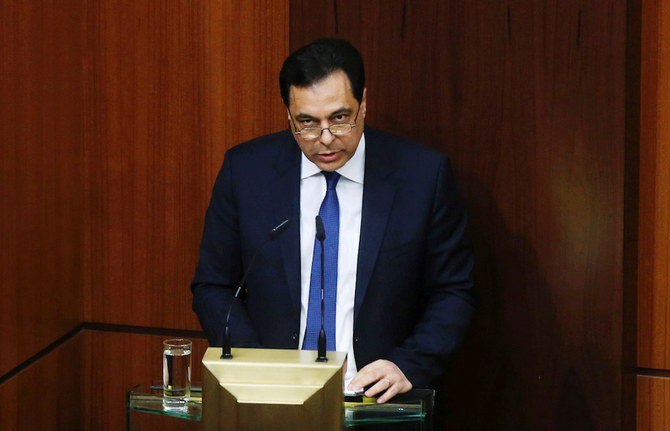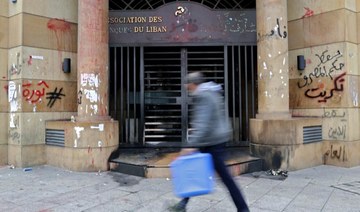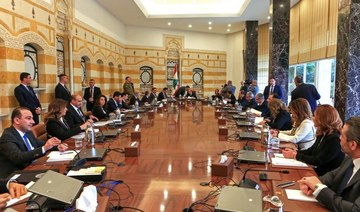BEIRUT: Senior Lebanese politicians are expected to refuse to pay an external debt on time and are seeking technical assistance from the International Monetary Fund (IMF).
Lebanese President Michel Aoun said: “The financial and economic crises that Lebanon suffers from can no longer be solved easily and have necessitated relatively harsh measures for the Lebanese, and the cost today is higher than before.”
On Wednesday, Aoun warned that “everyone who reached out to the treasury will be tried according to the law before a special court specializing in financial crimes against public money.”
The government of Prime Minister Hassan Diab, which won modest confidence in parliamentary votes on Tuesday night, faces its first financial obligation after 25 days, as Lebanon has to pay a domestic and external debt of $1.2 billion. The debt consists of treasury bonds issued by the Ministry of Finance in March 2010 for a period of 10 years, with an annual interest of 6.375 percent. The external debt is about $800 million, while the domestic debt is about $400 million.
A source close to Minister of Finance Ghazi Wazani told Arab News: “The government is moving toward developing a program to request technical assistance from the IMF and launch a negotiation process with creditors based on the advice of the IMF, with the aim of restructuring public debt in order to avoid seizure of the ministries by the IMF and interference in Lebanon’s economic policy.”
Marathon meetings are being held at the Ministry of Finance to prepare this plan before the end of February. The source said: “There are two tendencies in the state, a political tendency to postpone the payment of the debt and an economic tendency to pay the debt on time and negotiate over the coming months.”
An economist loyal to the political opposition in Lebanon told Arab News, on condition of anonymity, that “Lebanon can postpone the payment of its debt in one case when it has an integrated plan to present to the creditors and tell them ‘this is the solution.’ Restructuring of the debt is part of this solution. Going to the creditors without a plan is the easiest way to take Lebanon to a new crisis situation.”
The economist pointed out that “there are those who say that paying the debt will be from the accounts of the depositors in banks. If it is correct, what will happen? The government talked about an emergency plan. Is this the program that you will present to the IMF and creditors? Why was this plan not attached to the ministerial statement to gain confidence on the basis of it in parliament?”
The Association of Banks in Lebanon urged the government to pay the debt on time. The association said that Lebanon “has already pledged to fulfill its financial obligations.”
The association said in a statement that “failure to pay Lebanon’s external debts should be thought about very carefully. What is required is time, contacts, mechanisms that are in line with international standards and seeking the assistance of the competent international bodies. The remaining period until the debt is due is very short and does not allow time for preparation and dealing efficiently with this important national issue.”
Economist Jad Shaban, who is one of the activists in the civil movement, told Arab News:“The government must define its priorities. Is preserving Lebanon’s international reputation more important than ensuring the state’s finances? Lebanon has a very low credit rating and losses have become a reality, and the government must now prioritize its assets in dollars.”
Shaban added that the government “lacks popular legitimacy because it is a new facade of the existing authority.”
The International Support Group for Lebanon stressed Beirut must “implement concrete, credible and comprehensive reforms quickly and resolutely to stop and reverse the growing crises, and to meet the needs and demands of the Lebanese people.”




























